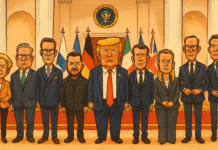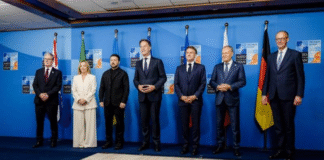|
Getting your Trinity Audio player ready...
|
Could a digital feud between world leaders spark a nuclear confrontation?
That unsettling question emerged after former U.S. President Donald Trump ordered two nuclear submarines to move closer to Russian waters, citing inflammatory social media remarks made by former Russian President Dmitry Medvedev. The online spat has raised eyebrows globally, but for now, Moscow appears unfazed.
Despite the high-stakes rhetoric, Russia’s response—or lack thereof—has been telling. Neither the Kremlin, the foreign ministry, nor the defense ministry has made any official statement. In fact, Russian media coverage has largely dismissed Trump’s actions as a publicity stunt.
Speaking to Moskovsky Komsomolets, one military analyst brushed off the U.S. move as nothing more than “a temper tantrum.” A retired Russian lieutenant-general quoted in Kommersant called Trump’s submarine threat “empty noise,” suggesting the former president was simply indulging in theatrics. Another security expert doubted that any genuine military orders were issued at all.

Kommersant also recalled a similar situation in 2017, when Trump claimed to have sent nuclear submarines near North Korea—only to later hold diplomatic talks with Kim Jong Un. Could this current move be setting the stage for a surprise summit between Trump and Russian officials? Experts remain skeptical.
The silence from Russian authorities likely indicates one of two things: either Moscow is still assessing the situation, or they don’t see the need to respond at all. Judging by local press commentary, the latter seems more probable.
The root of this diplomatic drama lies in a heated exchange between Trump and Medvedev on social media. Following Trump’s announcement that Russia had less than two weeks to end the war in Ukraine—an abrupt reduction from his previous 50-day deadline—Medvedev accused Trump of escalating tensions through ultimatums.
Trump fired back: “Tell Medvedev, the failed former Russian president who thinks he is still in power, to be careful what he says. He is entering very dangerous territory.”
Medvedev’s next post referenced “Dead Hand,” the Soviet-era automated nuclear response system—an ominous gesture that Trump did not take lightly.
Though Medvedev was once viewed as a moderate voice during his presidency from 2008 to 2012, his tone has grown increasingly aggressive since Russia’s invasion of Ukraine. While his recent posts are rarely seen as reflecting official Kremlin policy, this time, he caught Trump’s attention—and ire.

In an interview with Newsmax, Trump defended his actions, stating: “When you mention the word nuclear, my eyes light up and I say we better be careful, because it’s the ultimate threat.”
For those familiar with Trump’s style, this may be another instance of his trademark unpredictability. Whether in business or geopolitics, Trump has often used shock moves to unsettle opponents—possibly in preparation for negotiation or to assert dominance.
Could the submarine deployment be part of a broader strategy to push for peace in Ukraine? Or is it simply an impulsive reaction to a digital jab?
Whatever the case, while Trump’s rhetoric heats up, Moscow remains notably cool.
Danchima Media – Where Headlines Meet Context
For more political analysis, international affairs, and expert commentary
















